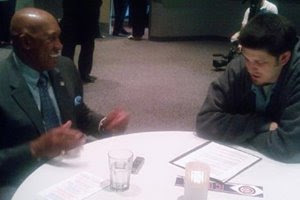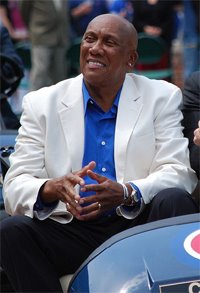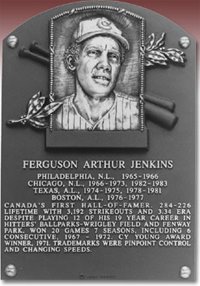It’s rare that a Major League Baseball player (past or present) will say “sure, I’ll talk with you” via email or any other medium.
But when a Hall of Famer will actually devote some time to do a one on one sit down interview with you four days after having his number retired…you do what you can to make it happen.
Such was the case last Thursday, when The Hall had the unique opportunity to talk baseball, steroids, mustaches and hockey with 284 game winner Ferguson Jenkins.
Here’s how it went down.

FERGIE: The first time I came here (as a Phillie) I didn’t think it was all that great. It became interesting because Cub fans are different from others…knowledgeable, smart and loyal. They come out regardless…win or lose. There have been a lot of nicknames for the Cub fans that I think are not good. But Cub fans take it. They’d like to see their team win, so when they do win…I think the city will go crazy.
HOVG: After your first stint in Texas, you went to a similar atmosphere in Boston. You know, that’s quite the debate on a number of message boards, chatrooms, etc…Wrigley vs. Fenway. How do the Fenway fans stack up to those at Wrigley?
FERGIE: The Fenway crowds are very good. If you’re playing against the Yankees, there is always that love-hate relationship in the stands. They always want you to perform well because you’re the home team…they want you to beat the nemesis. Fundamentally, when you go out there, you already know in the back of your mind that you’ve got to perform well. You’ve got to put your A game together and win and the fans respect you for that. If you don’t win on that particular night, (the fans) are honest enough to know that you gave what you could to win. Giving up is not in my vocabulary…I love to win.
HOVG: You came to the mound to “Canadian Sunset” in Chicago…did that follow you to Texas and Boston?
FERGIE: No. The only place that they ever played it was Chicago. It was nice to hear that. They recognized you as a certain individual and I was a Canadian.

FERGIE: Structure wise I am a little bigger than Glavine and that’s the way the game is now. In his era, maybe he was a decent player…but I didn’t get to see him skate. I was a decent hockey player.
HOVG: Outside of hockey, you also played basketball. In 1967 and 1968, you actually played with the Harlem Globetrotters. How did that come about?
FERGIE: (The marketing guru for the Globetrotters) came to see me one afternoon at Wrigley Field and he wanted to know if I was going to go (back to Canada) in the off season. He said that they were going to start their tour in Sherbrooke, Quebec and asked if I would like to join their team and be part of their skit as the pitcher. I went over and worked out with them a couple of times…we got our routine together and after a while, they found out I was a decent player. I used to play every third quarter. But my fundamental opportunity for playing was to give up a home run every night to Meadowlark Lemon.
HOVG: Was it your two years on the hardwood, traveling the globe that encouraged you to grow out the mustache and afro?
FERGIE: (Laughs) A lot of times guys would come to spring training with a mustache or beard but would take it off. I just think that when you got to a team…some guys had a little bit that they wanted to do. When the afro started to become a trend, I started growing mine a little bigger.
HOVG: Some people, myself included, believe the mustache to be the ultimate performance enhancer. Do you believe that your mustache was the catalyst to seven 20 win seasons in eight years?
FERGIE: No, not really. (Laughs) The way you get driven to win games, is to try and be consistent. You try to prove to yourself and your teammates that you’re as good a player as anybody else in the league. Gibson, Drysdale, Koufax, Bunning…or any of the other pitchers in the league. They’re the number one pitchers on their staff and you’re the same on yours. That makes you drive yourself a little harder to try and win more games.
HOVG: In all seriousness, with the talk of steroids all over the sports channels and what not…what are your feelings going to be when a player who has admitted use, and it’s bound to happen, gets elected to join you in Cooperstown?
FERGIE: I don’t think (it’s bound to happen). Whoever has the vote, the Hall of Fame committee…the 500 plus reporters, they’re not going to vote for them. Guys like Sosa might not make it. Neither will Bonds or McGwire. A-Rod might not make it. Once you get that particular black mark on your record, they are not going to give you the required amount of votes. You have to get 75 percent. McGwire only got 22 percent. He’s not even close.
HOVG: If someone that is suspected of steroids makes it in, like Clemens, are you on that stage when they’re inducted?
FERGIE: I don’t know, I’d have to wait and see. I know Bob Feller voiced his opinion already. There’s a few guys who voiced their opinion and said they wouldn’t go. (Al) Kaline probably wouldn’t go. Some of the guys who are staunch advocates of playing the game clean…they probably wouldn’t show.

FERGIE: Gaylord Perry won 314 games. Rod Carew had eight batting titles. I had some consistency in my career too. Three pretty good athletes went in in 1991, so I was pretty happy with the circumstances. My mother always said I had a gift for gab, and, you know, I very seldom get nervous.
HOVG: What’s hotter…the heat on that podium, or getting called into Billy Martin’s office, who incidentally, managed you, Carew and Perry at different times in your careers.
FERGIE: Getting called into Billy Martin’s office. Two managers of mine, Leo Durocher and Billy Martin had an open door policy. You could go in and talk if you had a beef with something. But I watched too many reporters get thrown out that I wasn’t going in. If I had to talk to Billy, it was probably on the bench.
HOVG: I’ve got a friend in Toronto, David Allan, who is obsessed with Canadian baseball. He’s been over at my site, The Hall of Very Good, touting the efforts of Larry Walker. Who in your estimation has the best chance of being the NEXT Canadian in the Hall?
FERGIE: I think as a hitter (Walker) has the numbers. An MVP, some batting titles, a lot of home runs…he supported his team very well. I think he’s got a great opportunity. I’d like to have some company.
Ferguson “Fergie” Jenkins is a native of Chatham, Ontario, Canada. He was a three time All-Star and the winner of the 1971 National League Cy Young Award. While most of his career was spent playing for the Chicago Cubs, he also had stints with the Philadelphia Phillies, Texas Rangers and Boston Red Sox.
You can learn about his foundation HERE.
Add The Sports Daily to your Google News Feed!
